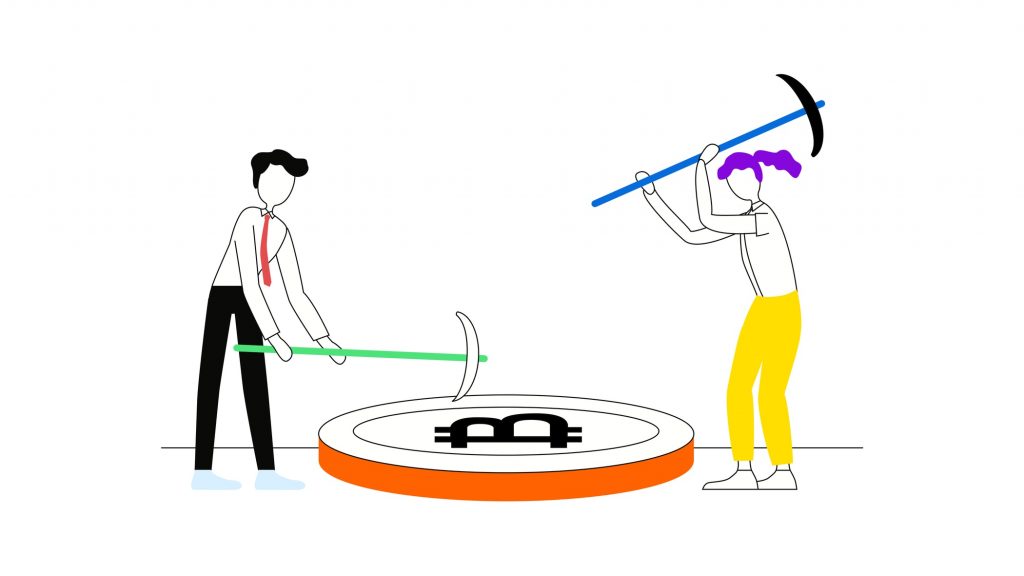
Bitcoin mining is one of the most popular means to acquire cryptocurrency. Miners worldwide are in a quest to mine the remaining 2.5 million of the overall 21 million Bitcoins issued. For cryptocurrency newbies, Bitcoin mining may sound like digging the undergrounds of the earth for some coins or, in the simplest term, a treasure hunt. The definition of Bitcoin or cryptocurrency mining is not far from that idea, but it is done virtually.
Bitcoin mining involves solving complex mathematical problems by using advanced computer systems. Usually, this method of acquiring Bitcoins requires technical and analytical skills. Miners crack mathematical issues that are often impossible to be solved by hand and need investment in software and hardware. Miners coined these mathematical problems as “computational puzzles.”
The first purpose for Bitcoin mining is to acquire newly-minted Bitcoins. Miners crack the mathematical complex problems, and in turn, they are rewarded with Bitcoins. The second purpose is solving these mathematical problems to verify all transactions in the Bitcoin network, making it secure and trustworthy.
Users of Bitcoins are allowed to send, receive and transfer coins throughout the cryptocurrency’s network. Their transactions are recorded and verified in an advanced public ledger system known as “blockchains”. Bitcoin miners’ responsibility is to classify all transactions as “blocks” and add them to the public ledger system or the “blockchain”. Verifying these “blocks” can be made by any independent single observer even through time because nodes maintain records in these “blockchains.
It is also the responsibility of Bitcoin miners to ensure that all transactions made in the blockchain are accurate and legitimate. Further, they also made sure that Bitcoins transferred or spent is not duplicated, or in the digital currency industry, it is called double-spending.
Bitcoin mining is an investment and challenge for most miners. It requires a massive amount of energy, a sophisticated computer system and technical skills. Even though this method generates substantial income for miners, mining also needs significant operational funds because of bitcoin rewards and transaction fees.
For cryptocurrency enthusiasts interested in acquiring digital assets but are not equipped for mining, trading platforms and exchange are already available online. These are advanced and secure apps where users can buy and trade cryptocurrency with the guidance of financial experts and brokers. Initially, Bitcoin’s market price was priced at $0 during its first introduction, but since it rose to popularity, its market capitalisation is now at $755.44. Because of its promising results in financial investments, more and more people are being enticed to Bitcoin mining and trading. However, cryptocurrency is considered one of the high-risk investments along with stock trading. Thus guidance of financial experts, careful data analysis and rigorous trading method is highly recommended.
Table of Contents
Defining Mining Pool
When miners form a group or organisation and then combine all their computer and hardware resources, they are known as “Mining Pool”. Miners usually create a group to conduct their bitcoin quest or manage a blockchain.
If the mining pool becomes successful in solving mathematical problems, miners will be rewarded with Bitcoins. Rewards are divided among miners, and the portion that they will gain depends on the work they render or the processing power that their system contributed. Miners can either go solo or join groups where they collaborate with other miners to improve their hashing output. For instance, when a mining pool combines twelve mining devices with the power of 335 mega hashes per second, it can now generate 4 gigahashes of mining power. Consequently, these would make faster processing and verification of the hash algorithm
Mining Pool Method
There are diverse mining protocols that guide the cryptocurrency mining pool. Methods followed by the existing mining pools differ from each other.
Peer-to-peer Mining Tools
This kind of mining pool method aims to preserve the decentralised characteristic of mining. Miners integrate separate blockchains in the mining pool system. The advantage of this kind of method is it prevents cheating incidents among miners, and it lessens the risk of system breakdown. The centralised system is often prone to breakdowns, and this can be avoided through Peer-to-Peer Mining.
Proportional Mining Tools
This is the most common type of mining pool method. Miners link their processing systems and conduct mining of bitcoins or blockchains. They continuously receive shares until a Bitcoin is mined or they successfully find a block. Miners are rewarded according to the number of shares they are holding.
Pay-per-share Tools
These kinds of mining pool methods work like the proportional mining method. But these mining pools continuously reward their members regardless of when the blocks will be mined. Miner part of the mining pool implementing this method can exchange their share with a payout anytime.
Advantages of Mining Pool
Individual mining is an option for cryptocurrency mining, but chances of success in individual mining are pretty low. Further, this kind of method requires massive funds and energy resources. Individual mining is not any more profitable these days; this is because the popularity of cryptocurrency leads to whopping costs of sophisticated hardware used for mining. The funds needed to be an individual miner usually outweighs the potential return of investment that an individual miner can attain.
These gave rise to the formation of mining pools. Operational costs of the mining system are divided among members, thus increasing the chance of profit returns. Creating and joining in a mining pool usually escalates the possibility of the team for successful operations and rewards.
Cryptocurrency mining is just one of the many ways to be successful and earn a profit through this emerging digital asset. Visit and log into the Bitcoin Prime website to start trading today.





More Stories
Comparative Analysis of Digital Gold and Silver: Bitcoin and Litecoin
Bitcoin Deep Dive: Exploring the World of Digital Wealth
Creating a Winning Oil Trading Mindset